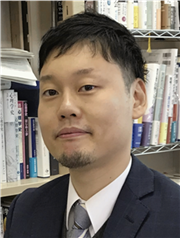
プロフィール
所属先・役職: 福島県立医科大学 衛生学・予防医学講座 講師
専門は社会心理学、文化心理学、公衆衛生学。博士(文学)および博士(医学)。日本学術振興会特別研究員(DC2)(2010年~2012年)、福島県立医科大学医学部衛生学・予防医学講座の助手(2012年~2016年)、助教(2016年~2018年)を経て現職に至る。
東日本大震災ならびに福島第一原子力発電所事故の被災地である福島県にて、避難者が自らの手で地元地域の復興に携わる意味に関する質的研究(Jpn Psychol Res. 2021, DOI: 10.1111/jpr.12369)、地域高齢者における住宅保有状況と幸福感の関連についての疫学的研究(Geriatr Gerontol Int. 2020, 20: 615-620)などに従事。質的研究・量的研究双方の技術を用い、広く「住まうこと」と「ライフ(生命、生活、人生)」との関係性を探求している。
2013年に論文「神経難病患者の生を捉えるライフ・エスノグラフィ――在宅療養の場の厚い記述から」により日本質的心理学会の優秀論文賞、2014年には「Anxiety over radiation exposure and relevant factors of decontamination workers in Fukushima Prefecture, Japan」の演題により第21回アジア産業保健会議のYoung Investigator Fundingを受賞。主著に『コミュニケーション支援のフィールドワーク: 神経難病者への文化心理学的アプローチ』(ナカニシヤ出版、2018年)。
Profile
Tomoo Hidaka, Ph.D.
Assistant Professor, Department of Hygiene and Preventive Medicine, Fukushima Medical University
Tomoo Hidaka, having Ph.D. in psychology and medicine, is a research psychologist who majors in social and cultural psychology and public health. He is working as Assistant Professor of the Department of Hygiene and Preventive Medicine at Fukushima Medical University. He experienced the Research Fellow for Young Scientists (DC2) of Japan Society for the Promotion of Science (2010 – 2012) and research positions such as research associate at Department of Hygiene and Preventive Medicine at Fukushima Medical University, and then assumed the present post.
In Fukushima Prefecture, which was affected by the Great East Japan Earthquake and the Fukushima Daiichi Nuclear Power Plant accident, he has been engaged in qualitative research on the meaning of evacuees’ involvement in the reconstruction of their local communities (Jpn Psychol Res. 2021, DOI: 10.1111/jpr.12369), and epidemiological research on the relationship between housing tenure status and happiness among local older adults (Geriatr Gerontol Int. 2020, 20: 615-620). Using qualitative and quantitative research methods, he explores the relationship between “housing” and “life.”
He won the excellent article award from the Japanese Association of Qualitative Psychology in 2013 for the paper “Life Ethnography of a Life of a Person with Intractable Neurological Diseases: Based on ‘Thick Description’ of Home-care,” and the Young Investigator Funding at the 21st Asian Conference on Occupational Health in 2014 for the presentation entitled “Anxiety over radiation exposure and relevant factors of decontamination workers in Fukushima Prefecture, Japan.” One of his major works is published as the book entitled “Fieldwork of communication support: cultural psychological approach to the persons with neural intractable disease” (Nakanishiya Publishing, 2018).
